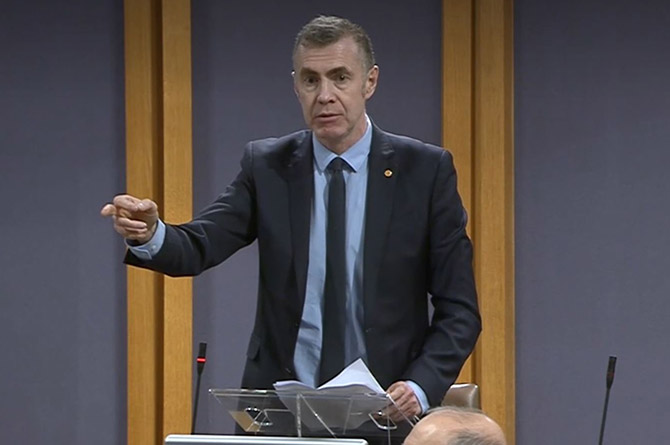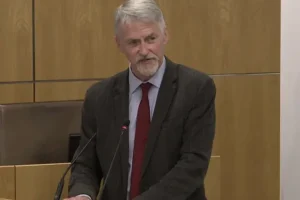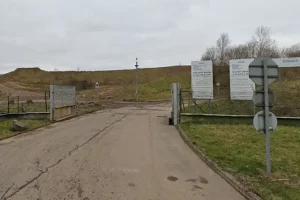ADAM PRICE urged ministers to consider legal action over £432m “owed” to Wales by the UK Government for rail spending and increased national insurance costs.
The former Plaid Cymru leader warned that a decision to reclassify an Oxford-to-Cambridge railway line as a “England-and-Wales” project cost Wales £360m in consequential funding.
Mr Price asked Welsh ministers: “If the change was made – as it ostensibly was – without consultation or adequate reasoning, what legal hurdles would the Welsh Government face in bringing a case and what remedies might be available?”
Julie James, who is counsel general, the Welsh Government’s chief legal adviser, replied: “I don’t think that’s something we want to particularly take to court.”
Ms James pointed to an extra £445m for rail in Wales in last week’s UK Government spending review, welcoming a “step change” in the level of investment in the past year.
But Mr Price suggested the decision to reclassify East West Rail after four years as an England-only project created a legitimate expectation in legal terms for budget planning.
During counsel general questions in the Senedd on June 17, he criticised the “completely unexplained reversal” on the project which has “no direct nor indirect benefit to Wales”.
The shadow justice secretary said: “That seems to me to amount to a breach of procedural fairness, or potentially even cross the Wednesbury threshold of irrationality because it’s a perverse decision – and that’s why no real explanation has been proffered.”
He urged Welsh ministers to issue a pre-legal action letter compelling the UK Government to disclose the reasoning behind the reclassification.
Ms James, who could not explain the four-year delay, replied: “I don’t think that that would be a good use of the government’s resources at all.”

The Labour politician told the Senedd national planning on heavy rail is done on a England-and-Wales basis, so any scheme in England would proceed as such.
“And, actually, so would any scheme in Wales be on an England-and-Wales basis,” she said. “So, a line with nothing touching England would also be on an England-and-Wales basis.
“The real issue for us is that there aren’t any of those second ones. We’ve been seriously underinvested in and what we now need to see are those investments coming into Wales.
“We need to make sure that the pipeline is an England-and-Wales pipeline and not just an England pipeline, as it was under the previous [UK] Government.”
Ms James said she would like to see heavy rail devolved because the current system has “muddied the waters for sure”.
Mr Price also suggested legal action over a £72m shortfall in funding from UK ministers to cover the increased cost of national insurance contributions in the Welsh public sector.
He told Senedd members the UK Government’s statement of funding policy states devolved administrations should suffer no detriment from UK policy decisions.
Questioning whether there is a credible legal route through judicial review or other means to secure full reimbursement, he asked: “What factors would determine whether that policy wording is legally enforceable?”
Ms James replied: “I think it is a clear breach of the funding policy and the finance minister has been more than plain that he also regards it as a clear breach….
“The question you’re asking me, though, is is it worth trying to take some sort of judicial approach to putting that right and I think that our view is that it isn’t because that will involve an enormous amount of expenditure, it’s quite a sledgehammer.”

She was further pressed by Plaid Cymru’s shadow finance secretary Peredur Owen Griffiths, who warned the UK Treasury acts as “judge, jury and executioner” on such decisions.
Reiterating that heavy rail is not devolved, Ms James replied that the rail example “perfectly illustrates” what’s wrong with the Barnett formula – the mechanism used to allocate additional funding to Wales.
But she said: “I don’t think that it would best serve the Welsh public to spend resources on arguing with HM Treasury about whether that’s a mistake or the classification—.
“I don’t think that would get us anywhere. I don’t think that we would have a decent legal argument to put up that it wasn’t a mistake, and I think that we would ultimately fail.”
Ms James said ministers are concentrating on making sure the England-and-Wales pipeline “has a Wales bit in it”, arguing a legal case would cost a lot and not get very far.















